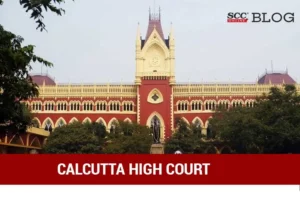Calcutta High Court: In a revisional application challenging the trial court’s order which allowed the application for substitution of legal representative of the deceased plaintiff based on registered Will, a single-judge bench comprising of Shampa Sarkar, J. opined that an Executor has the authority to represent the estate of the deceased, and the onus is the opposite party-respondent to prove his right to maintain the suit.
The Court dismissed the revisional application, stating that the issue of whether the properties are the same or distinct will be determined during the trial.
Brief Facts
In the instant matter, the revisional application stems from an order dated 07-11-2022 issued by the Civil Judge (Junior Division) which allowed the application under Order 22 Rule 3 of the Civil Procedure Code, 1908 (CPC) filed by the opposite party. The opposite party was substituted as the legal representative of the deceased plaintiff, based on a registered Will.
The deceased plaintiff executed a Will appointing the opposite party as the Executor and bequeathing the suit property to him. The right to sue devolved upon the opposite party as the Executor of the Will.
The civil court reviewed the Will and found that it was registered, and that deceased plaintiff had bequeathed the property to the opposite party. The civil court held that the law didn’t require the Executor to obtain probate to represent the estate in a legal proceeding.
Contentions
The petitioner challenged the order, contending that the suit involved different properties not covered by the Will and that the opposite party could not be substituted for the entire estate. The petitioner contended that deceased plaintiff intended to bequeath only a specified portion of the property in the Will. The petitioner further claimed that the property was thika property and, therefore, the suit was not maintainable.
Moot Point
-
Whether the substitution of the opposite party as the legal representative of the deceased plaintiff was appropriate?
-
Whether the properties described in the schedule of the suit and the schedule of the Will were the same or distinct?
Court’s Decision
The Court stated that both the properties in question have the same premises number. “The onus is on the opposite party (substituted Executor) to prove that he could maintain the suit for eviction and the reliefs prayed for could be granted to him. These are matters of evidence. Whether the property in the schedule of the plaint and the schedule of the Will were same or distinct cannot be decided without trial. Such issues will be adjudicated at the time of trial.”
The Court found that the properties described in the schedule of the suit and the schedule of the Will shared the same premises number. The Court held that the onus was on the opposite party, the Executor, to prove his ability to maintain the suit, and these issues required a trial. The court upheld the order, allowing the substitution of the opposite party as the legal representative and dismissed the revisional application, giving the petitioner the liberty to raise points at the trial.
[Om Prakash Bajoria v. Sonaram Das, 2023 SCC OnLine Cal 3486, order dated 10-10-2023]
*Judgment by Justice Shampa Sarkar
Advocates who appeared in this case :
Mr. Siddhartha Lahiri, Mr. Debraj Dutta, Counsel for the Petitioners

